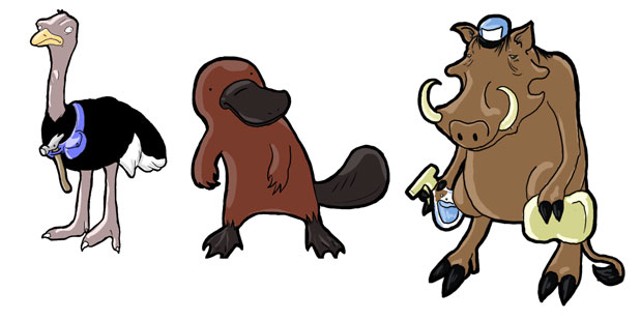Published October 22, 2008 at 5:58 a.m.
Kids and video games have gone hand in hand since the dawn of Pong, but most kids’ play schedules still include a healthy dose of the great outdoors.
Several years ago, Peter Bingham, a pediatric neurologist at Fletcher Allen Health Care, came up with a way for children restricted to indoor recreation to improve their health — through video games.
Bingham realized that one particular population of children was especially in need of such reinforcement: cystic fibrosis patients. A genetic disease, cystic fibrosis affects the exocrine glands, causing an overproduction of mucus throughout the body. This leads to digestive problems and, most seriously, to mucus-filled lungs, often requiring a transplant.
The life of an afflicted child is fraught with doctor visits, nebulizers and daily chest poundings to loosen the phlegm from the lungs. Breathing exercises are encouraged, but they can be tiresome and easily forgotten, especially by a child who is still relatively active and healthy.
With these kids in mind, Bingham conceived a target-tracking game that could be controlled by a spirometer, which measures the volume of air breathed in and out. With a grant from the Robert Wood Johnson Foundation’s Pioneer Program, Bingham took his idea to Champlain College’s Emergent Media Center, a training ground for software developers and designers.
The project interested the center’s director, Ann DeMarle, and her team of students as an example of biofeedback, or electronically tracking the body’s real-time responses to help subjects learn to control their physiological processes. Just as the controller and platform-based games on Nintendo Wii Fit can act as a personal trainer, the team hypothesized, a game designed along the same lines could build and reinforce lung strength in patients.
Two teams of students — each composed of a designer, programmer, developer and producer — met with a respiratory therapist, who mapped the breathing regimens that would be of greatest benefit to players. The young game makers then set about building programs around the inhalation and exhalation sequences.
Next, Bingham and the students interviewed young CF patients about their favorite video games and brainstormed from the responses. Recruiting testers was, sadly, easy. “There’s always one or two in the hospital, bored and playing video games,” Bingham said, “so they’re the perfect ones to test-drive it with.”
The students conceptualized games based on their subjects’ whims. They developed two, both aimed at patients between the ages of 8 and 12. After that age, said Alison Seffels, a sophomore game design major at Champlain College, “they don’t want to do their breathing exercises because the effects aren’t immediate. So we’re trying to get them in the habit when they’re younger.”
In patient interviews, racing games tested as popular across genders. So one team began developing Ludicross, a fast-paced race among a unique cast of animals, including a lynx and a platypus. “We incorporate the breathing with power-ups, which require a certain sequence of breathing,” said Michael Lahens, senior game development major and Ludicross producer. “To attack with a weapon you have to use a certain breath. Between each race, you have a pit stop where you have to tune up your car, with breathing exercises associated with them.”
Seffels and her team came away with a different take on the young interviewees’ desires. “A lot of the kids really liked being outside, liked going places,” she said. “But with CF, they have to always be close to a hospital in case things get really bad.”
The result of these insights was an exploration game called Creep Frontier that takes a literal view of the patients’ daily battles. “There’s an evil sludge taking over the world, getting on animals and plants, and you get a bubble gun,” said Seffels, who was the game’s lead designer. “As you get closer to your target, breathing exercises will trigger. When you complete a mission, you complete your set of exercises for the day.”
Creep Frontier has the additional appeal of Pokémon-style collecting. Freed of the slime, animals follow the player’s character home to win points for him or her that can be used to purchase electronic prizes. With additional funding, this aspect of Creep Frontier could be expanded as a way to unite the players through the Internet. Bingham hinted that a local company is helping develop a tool for competitive play on the Web, but he is not yet willing to disclose the name of the business.
Lahens — whose brother is a University of Pennsylvania grad student in Bioinformatics — stresses the importance of finding ways for young players to interact, even if they’re virtual.
And sometimes they need to be. “One of the things that I found interesting about cystic fibrosis,” he said, “is patients develop their own strains of super-bacteria, so there’s a rule that those patients can’t be within 5 feet of other CF patients.”
The Emergent Media Center is looking for funds to promote further work on this unique online community. Meanwhile, Bingham sees the project’s goals as going beyond physical healing.
“When you get a new system awareness about something as basic as breathing, you get a new signal,” he noted — referring to a new connection in the brain. “It’s a paradox, but in getting to know oneself better with electronics, there’s something spiritual.”
More By This Author
Speaking of...
-

Video: Dr. Rachael Floreani & Irfan Tahir Discuss the Future of Lab-Grown Meat
Dec 7, 2023 -

Williston Tech Company Polly Lays Off 17 People in Vermont
Dec 5, 2022 -

Report: Investment in Vermont Companies Soared Nearly 500 Percent Last Year
Apr 5, 2022 -

Tech Biz Resonant Link Raises $9 Million, Plans to Double Staff
Feb 9, 2022 -

Hire Anxiety: Layoffs Jolt Burlington-Area Tech Sector
Nov 6, 2019 - More »
Comments
Comments are closed.
From 2014-2020, Seven Days allowed readers to comment on all stories posted on our website. While we've appreciated the suggestions and insights, right now Seven Days is prioritizing our core mission — producing high-quality, responsible local journalism — over moderating online debates between readers.
To criticize, correct or praise our reporting, please send us a letter to the editor or send us a tip. We’ll check it out and report the results.
Online comments may return when we have better tech tools for managing them. Thanks for reading.















































